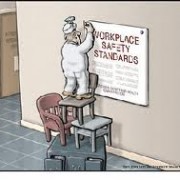What is work?
There will be significant implications for many employers following a recent Employment Court Case. If your employees attend training, meetings, work functions or travel for work purposes you may need to reconsider how you pay them.
The case involved the Smiths City Group. Every morning prior to opening, the sales manager at each of their 29 locations holds a 15 minute morning meeting to discuss issues and talk about sales promotions and targets. The employees were not paid for their attendance.
In January 2016 a Labour Inspector issued an improvement notice to Smiths City that required the organisation to undertake an audit to identify where wages had been paid below the statutory minimum. The audit was for all employees who attended the 15-minute morning meeting who was on, or close to, the minimum wage rate and it applied across all 29 stores. The audit had to cover all current and previous employees for the last six years. The company was to calculate the arrears of pay below the minimum wage and reimburse those arrears accordingly.
Smiths City objected to the improvement notice claiming the 15 minute meeting was not work. In addition, Smith City was claiming the commissions and bonuses paid to employees ensured they were paid above the minimum wage even when the hourly base rate was at the minimum wage and the 15 minute meeting was deemed to be work. The matter went to the Employment Relations Authority and the Authority agreed with Smith City, rescinding the notice. The Labour Inspector appealed, and the case was heard by a full bench of the Employment Court.
The Employment Court looked at the Idea Services case (known as the Sleepover case) as the basis for determining whether the 15-minute meeting was “work” for the purposes of the Minimum Wages Act.
Smiths City argued that the employees were not compelled to attend the meetings, that the meetings didn’t put a significant degree of constraint on the employees, and there was no responsibility on the sales staff during the meetings, and they argued that the meetings were not critical to the business.
The Employment Court found that staff were required to attend the meetings, and that while there were different expectations of behaviour in the meetings compared to when they were in the store, that it did not alter the fact that their personal freedom during those 15 minutes was constrained by the employer.
The Court rejected Smiths City’s claim that there was no responsibility on the employee during the meetings, but rather like a training course, the employees were expected to sit, listen and learn the information being presented by the Sales Manager so they could apply it during the day.
The Court also rejected Smiths City’s claim that both the employer and the employee benefited from attending the morning meeting, by earning higher commissions.
Accordingly, the Court found that the sales employees who attended the morning meetings were working during those 15 minutes.
That left the Court to consider whether Smiths City had breached the Minimum Wage Act. Smiths City contended that when the sales commission was taken into account, all of their sales staff earned more than the minimum wage. The method of payment was justified by the company because wages, and commission, were earned over the whole pay period which it considered to be the correct interval for the calculation of minimum wage.
The Court accepted that the commission does form part of wages, but said it didn’t satisfy s 6 of the Minimum Wage Act. The Court found that commission and incentive payments were not earned for attendance at the meetings and were not connected to hourly rates of pay generally. They were achieved against targets specified by the company. The commission payments were deemed to be additional income earned over and above the contractual hourly rate, and not a substitution for it.
The Court stated that Smiths City’s method of calculation did not satisfy the Minimum Wage Act. The Court reinstated the Labour Inspector’s Improvement Notice. This means Smith City will be required to backpay, for a six year period, any hourly paid employee who attended the morning meetings.
If you have concerns about how your remuneration is structured and whether you are inadvertently failing to meet minimum wage requirements, please contact our team.










